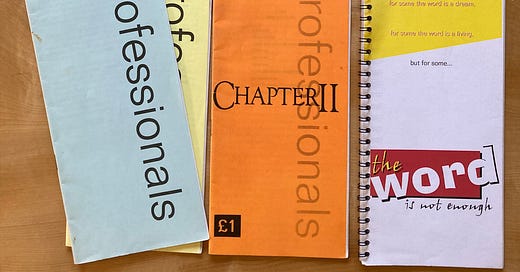When I was at high school, I didn’t really talk to anyone about my writing. I didn’t know anyone else who wrote and, even though I’d had a few poems published here and there, I was aware that most of what I was writing was not really good enough to share widely. I only wrote poetry at that stage, and most of them were teenage angsty, personal stuff that, if I shared, would inevitably lead to conversations I didn’t want to have, at least not with those people. There was no one I was particularly close to at school, and I have very, very few fond memories of that place.
University, then, was like stepping into Narnia. Literally an entirely new world, a fresh start, a place I could actually be myself. Narnia isn’t quite right as an analogy, because the kids had no idea Narnia was there; I knew university was out there. I was very aware of what I didn’t have in my life and the fact that it wasn’t fantasy. I’d read enough campus novels and seen enough coming of age movies to know that all I had to do was survive high school and get good enough grades so I could get the fuck out of there.
And, dear reader, that’s exactly what I did. In Fresher’s Week I found the creative writing society and joined up. Weirdly, I also found the live music society and, although I’d been in bands as a teenager, I decided I didn’t want to do that at uni. I was going to be a writer, not a musician. It made sense then, although now I wonder why I thought I had to choose between the page and the guitar.
Anyway, I found the creative writing society and joined up on the spot. I found the art gallery gift shop that sold magazines and journals like Poetry Scotland, Cencrastus, Chapman, literary journals that I, growing up in the countryside, didn’t know existed. Journals you could send stuff too. Journals that would publish people like me. I discovered readings, open mic nights, and, most importantly, a whole bunch of people who loved this stuff too.
But the university creative writing society was the heart of it all for me. Weekly meetings sharing work. Chatting about poetic structure, narrative arcs, character development. Then the pub after, talking about it all again and so much more. Arguing about Shakespeare, Woolf, the Beats, learning about the country, the world, with these friends from all over.
We held readings at the end of each semester and published these chapbooks to showcase the year’s best work. Some of the poems that ended up in Fences we Build are in here, as is my first published prose piece (not my first short story, which was in The Hope That Kills Us).
Over time people graduated, membership shifted, internal politics and personal interests changed. I joined other groups (Limousine Bull, for one, mentioned and spelt wrong in last week’s cutting), took proper creative writing classes, and became ever more convinced that this was my calling. I applied for a master’s in creative writing at Glasgow and got in. The rest is history. But for me, it all started when I finally escaped that school, set foot on campus, and found a little table at the fresher’s fair in the union behind which sat a couple of likeminded people. Some of those people are still good friends today and we catch up whenever I’m back home. So when I see these aging self-published books with rusted staples and damp marks from years of being stored in cheap flats or musty boxes, I am reminded of those meetings, of that fair, of that feeling of relief when I finally—finally—met my tribe and they welcomed me in.





Not Aberdeenshire but a hard growing up in Fife, just discovered Ghosting by Jennie Erdal
https://www.theguardian.com/books/2020/jun/07/jennie-erdal-obituary
Imagine if Dante had been to a 20th / 21st century state school. My partner is 73 and still talks about the ex-prisoners of war who became 'Sir' and took out their anger (PTSD) on the kids